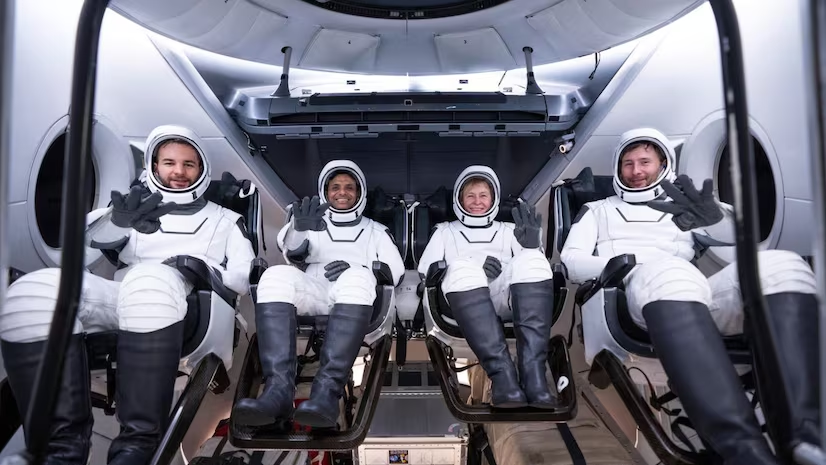A Giant Leap for India: Shubhanshu Shukla’s Historic ISS Mission
Table of Contents

In a moment that will forever be etched in India’s space exploration legacy, Air Force pilot Group Captain Shubhanshu Shukla soared into history as the first Indian to step aboard the International Space Station (ISS). On a crisp Wednesday afternoon, at precisely 12:01 pm, the SpaceX Falcon 9 rocket ignited its engines at Kennedy Space Center’s Launch Complex 39A in Florida, carrying Shukla and his fellow astronauts on Axiom-4, a private mission that marked a monumental milestone for India. As the Crew Dragon capsule docked with the ISS after a 28-hour journey, Shukla’s beaming smile and the warm bear hugs from the station’s crew captured a moment of triumph, not just for him but for an entire nation watching with pride. This journey, filled with challenges, scientific ambition, and human resilience, represents a bold step forward in India’s quest to explore the cosmos.
Axiom-4 A Thrilling Launch from a Historic Pad
The Axiom-4 mission began with a roar as the Falcon 9 rocket lifted off from the same launchpad that once sent Neil Armstrong and the Apollo 11 crew to the moon. For Shukla, this was more than just a launch—it was the culmination of years of preparation, dreams, and a grueling 30-day quarantine marked by six delays due to technical and weather-related issues. A last-minute software glitch nearly pushed the launch into a seventh delay, but with minutes to spare, the team resolved the issue, and the rocket’s Merlin engines thundered to life. Shukla later described the experience as “magical,” recalling the intense push against his seat followed by the serene silence of floating in space. “You’re just floating in the vacuum… and it’s magical,” he shared, his words resonating with the awe of someone who had just crossed the threshold into the unknown.
Axiom-4 The Delicate Dance of Docking
Reaching the ISS is no simple feat. After a 28-hour journey covering 424 kilometers above the northern Atlantic Ocean, the Crew Dragon capsule, aptly named Grace upon reaching orbit, had to perform a series of intricate maneuvers to dock with the ISS. This process, known as rendezvous and docking, requires the spacecraft and the station to align in the same orbital plane, matching their positions and velocities with pinpoint precision. At 4:01 pm (India time), Mission Control confirmed a “soft capture,” allowing Grace to gently connect with the ISS while absorbing the kinetic energy of the initial contact. Minutes later, a “hard capture” solidified the connection, and by 4:15 pm, NASA declared the docking complete. Mission Commander Peggy Whitson’s voice crackled through the live stream, expressing gratitude: “We are honored to be here… thank you.”
The crew—Shukla, Whitson, Poland’s Slawoz Wisniewski, and Hungary’s Tibor Kapu—didn’t immediately step into the ISS. The connection needed time to stabilize, ensuring no breaches in the seal could jeopardize the safety of the astronauts or the station. By 6:10 pm (India time), the hatch opened, and the crew floated through the vestibule, greeted by the seven astronauts already aboard the ISS with warm embraces and wide grins. A celebratory photo op followed, with the crew sipping liquids from foil packets, a nod to the unique challenges of eating and drinking in microgravity.
Axiom-4 A Packed Fortnight of Discovery
Shukla and his fellow astronauts have a busy 14 days ahead, packed with 60 scientific experiments that promise to push the boundaries of human knowledge. Seven of these experiments were proposed by India, showcasing the country’s growing influence in space research. One particularly fascinating study focuses on “water bears,” microscopic organisms known for their resilience in extreme conditions. By examining how these tiny creatures adapt to microgravity, scientists hope to unlock insights into how living organisms survive in space. Other experiments will explore bio-manufacturing and bio-astronautics, fields that could pave the way for sustainable human presence in space. For Shukla, these experiments are not just scientific endeavors but a testament to the collaborative spirit of global space exploration.
Axiom-4 Shukla’s Journey: A Collective Triumph
In a heartfelt message from the Crew Dragon capsule as it sped toward the ISS, Shukla reflected on the profound experience of the launch. “I am thrilled to be here with my fellow astronauts… what a ride it was,” he said, describing the surreal transition from the intense forces of liftoff to the weightless calm of orbit. He expressed deep gratitude to the countless engineers, scientists, and support teams worldwide who made the mission possible. “This accomplishment belongs to all of us,” he emphasized, highlighting the collective effort behind Axiom-4. For Shukla, this mission is not just a personal milestone but a shared victory for India and the global space community.
Axiom-4 Breaking New Ground for India
Shukla’s journey to the ISS is a landmark moment for India’s space program, which has steadily risen on the global stage with achievements like the Chandrayaan missions and the Mars Orbiter Mission. As the first Indian to set foot on the ISS, Shukla embodies the aspirations of a nation eager to leave its mark on the cosmos. His presence on this private Axiom-4 mission, facilitated by SpaceX and Axiom Space, signals a new era of international collaboration and commercial space exploration. Over the next two weeks, Shukla’s work will contribute to scientific breakthroughs that could shape the future of space travel and human survival beyond Earth.
A Moment to Inspire Generations
As Shukla floated into the ISS, his wide grin and the warm welcome from his fellow astronauts captured a moment of human connection in the vastness of space. This historic achievement is more than just a milestone for India—it’s a beacon of inspiration for young dreamers who look to the stars and imagine what’s possible. Shukla’s journey reminds us that space exploration is not just about technology or science; it’s about courage, collaboration, and the relentless pursuit of the unknown. As he conducts experiments and gazes out at Earth from the ISS, Shukla carries the hopes of a nation, proving that even the sky is no limit when determination and ingenuity come together.
Disclaimer: The information in this blog is based on publicly available reports and live streams of the Axiom-4 mission.
Source: Compiled from mission updates and statements provided by NASA, SpaceX, and Axiom Space.




